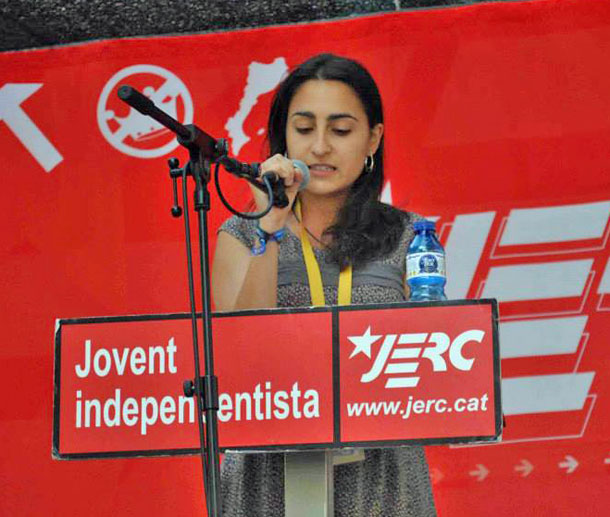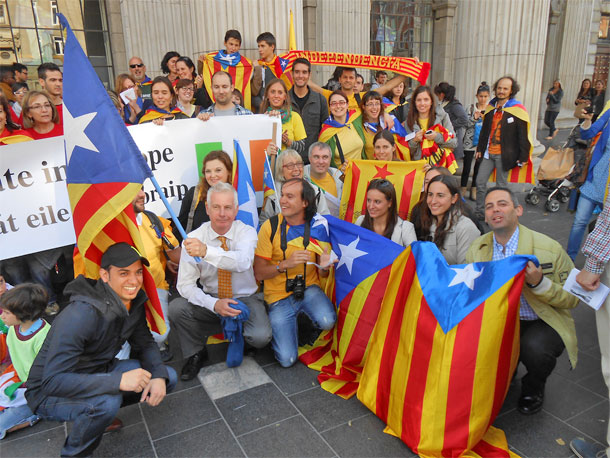2 February 2014 Edition
Choosing freedom – Catalonia’s independence vote

• JERC International Secretary Ariadna Jou
Spanish Army Colonel Francisco Alamán told reporters that Catalonia would only be independent ‘over my dead body and that of many other soldiers’
Catalan vote on independence, 9 November 2014
The questions:
Do you want Catalonia to be a state?
Do you want that state to be independent?
SCOTLAND will not be the only European country voting on whether or not to become a fully-fledged nation this year. The people of Catalonia, currently an autonomous region in northern Spain, will get to vote on independence after the regional parliament defied the Spanish Government to call for an independence vote for 9 November.
Announcing the decision last December, Catalan President Artur Mas called on the Spanish Government to allow a fair and democratic referendum on freedom for Catalonia. In January, he added:
“Catalans have won their right to decide their future because they have been able to keep their identity, their culture, their language and their rights despite the existence of unfair laws and norms.
“I ask the Spanish state to let us vote, to listen to the voice of the Catalan people.”
Spanish Prime Minister Mariano Rajoy immediately dismissed the move, saying it was illegal as the Constitution of Spain forbids any break-up of the state.
“I guarantee that this referendum will not happen,” the Spanish premier said, adding that there was “nothing to negotiate”. His governing right-wing People’s Party had earlier pledged to use “every means necessary” to stop the vote.
The spectre of fascist dictator Franco has been resurrected over Catalonia following threats from the politically outspoken Spanish Military Association (AME), composed of former soldiers, to court martial the Catalan President and anybody else promoting the break-up of the Spanish state.
Spanish Army Colonel Francisco Alamán had previously told reporters that Catalonia would only be independent “over my dead body and that of many other soldiers”.
A Twitter account run by Spain’s notorious Guardia Civil paramilitary police force warned of troops and tanks on the streets of Barcelona.

• Sinn Féin’s Seán Crowe TD celebrates Catalonia’s National Day with the Catalan community in Dublin
Ariadna Jou, International Secretary of the Young Republican Left of Catalonia (JERC), at the forefront of the pro-independence campaign over the last few years, told An Phoblacht:
“The people of Catalonia are sick and really tired of the Spanish Government’s behaviour. People are every day more convinced that the only solution is independence.”
Interventions by the Spanish military and state forces to physically prevent the vote taking place would be “a very stupid move”, Ariadna says.
“An aggressive response from the Spanish Government will be bad for themselves and their international image. They will be seen to be banning the right to self-determination. I hope that international pressure will prevent them from doing that.”
The pro-independence campaign will focus strongly on economic, cultural and linguistic arguments in its push for a double ‘Yes’ vote. Catalonia is one of the most powerful economic regions in Spain and much of the population feel they are subsidising Madrid through their taxes and not receiving a fair return. There is a widespread belief that the country would be in a far better economic state by breaking away from Spain. The issue of language rights for Catalan speakers will also play a large part in the debate as many feel the only way to safeguard its future is through complete independence.
Anti-independence parties and campaigners are expected to use similar scare tactics to those being employed against the Scottish independence campaign by implying that Catalonia would be left outside the European Union, or that Spain would move to block membership.
Recent claims by the campaign that 500 US companies based in Catalonia had plans to “flee” were dismissed by the US Ambassador to Spain as baseless and untrue.
Opinion polls show the pro-independence side with a slight lead. The decision to have two parts to the question is seen as a concession to middle-of-the-road nationalists who are in favour of a federal solution with maximum devolution from Spain but not total independence.
Ariadna says supporters of Catalan independence are also expecting to have to fight a campaign against the pro-Spanish parties who will try to dissuade voters from going to polling stations. “There is definitely a social majority in favour of independence. With the date set we have enough time to convince those who are still on the fence and to make sure people get out and vote. We will keep working right up to the referendum to make sure we get a ‘Yes, Yes’ vote and gain our independence.”




